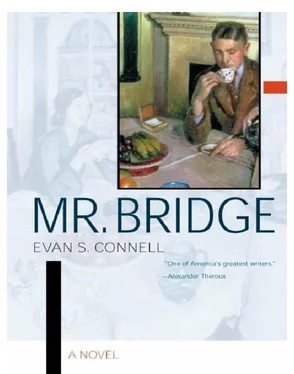So to Pigalle they went for dinner and a revue, and afterward in the taxi while they were returning to the hotel he joked about the cancan girls. He announced that he was planning to send a dozen roses to the one who had caught his eye; she replied that if he dared he would never hear the last of it.
But in their room after she had fallen asleep he lay awake with a somber expression. He remembered how the girls danced on one leg in time to Offenbach’s music and how they waved their skirts. The cabaret was filled with tourists and the sexuality of the spectacle was false, contrived for effect in every detail, like the black elastic garters stretched across their full young thighs; yet he had been astounded. What he had expected to see he had seen, and therefore it was not exciting, it was more in the nature of a confirmation; but he had been unprepared for the lascivious screams of the girls — screaming while they waved their skirts, as if their bellies were afire. Again and again he could hear those obscene cries in the musky silence of the Parisian night.
He turned his head on the pillow to look at his wife; she lay motionless in a deep, exhausted sleep. He thought of her affectionate embrace, which was invariably the same, and he felt resentful, for something which rightfully belonged to every man had been denied him.
Among the famous attractions in the environs of Paris which she was most anxious to visit were the Bois de Boulogne, the cathedral of Chartres, the palace of Louis XIV at Versailles, and the forest of Fontainebleau where the celebrated artists of the Barbizon school had worked. So he arranged for a limousine and a driver.
She enjoyed them all. Perhaps she enjoyed Versailles and Chartres more than any of the other sights because she so often mentioned the palace grounds and the tapestries, and the rich stained glass of the ancient cathedral. What he himself could not forget was the simple hut where Millet had lived. He could not understand why a man would endure such poverty unless it was inevitable, and in Millet’s case it was not inevitable: he had elected to live that way so that he could spend all of his time painting.
Mr. Bridge continued to think about this, and the more he pondered the indignity of living in a hut the more it annoyed and puzzled him, so that one afternoon as they were strolling on the Champs Elysées he suddenly remarked: “I do not insist a person has to live in a place like Versailles or anything of the sort. Far from it. But it beats me how that artist Millet could be indifferent to ordinary comforts. Lord, there wasn’t a toilet in that place, there wasn’t any heat, there wasn’t anything. If the fellow liked to paint pictures, all right, but if there was no public for his pictures why didn’t he get a job like everybody else? He could have done his art work over the weekend. If I’d been in his shoes that’s how I would have handled the situation.”
It was raining when they left Paris. The rain dropped straight down, warm and windless, and continued most of the day so they were not able to see much of the French countryside, but by the time they reached Lyon the sun was shining. There they spent the night, next morning they went to Avignon, where they visited the bridge, and after a few hours in Marseille they took the train to Cannes. They arrived very late, had dinner, and went to bed. Mrs. Bridge was asleep instantly, but for the second time in three nights he found himself restless and reluctant to close his eyes.
An hour or two went by. He could not lie in bed any longer. He got up and walked to the window where he stared at the Mediterranean and at the people sauntering along the esplanade and loitering in the cafes. Some of them were tourists, so it did not matter what they did; but many of them were French, many of them had to get up for work in the morning, yet there they were enjoying themselves as though nothing else mattered. He was mystified. He had observed very much the same thing in Paris, and to a lesser extent in London. Evidently these people managed to hang on to their jobs and conduct a certain amount of business while spending three hours at lunch and playing around half the night. In the United States that would be impossible.
He decided to go out. He looked at his wife. She appeared perfectly at peace, and was not apt to be disturbed to wake up and find him gone. He dressed, took the elevator to the lobby, walked out of the hotel, and crossed the boulevard to the esplanade. The branches of the trees were rustling in a warm sea breeze and a globular white moon hung like a Japanese lantern above the harbor. The indolence of the people was troubling. He walked to the edge of the water, where he folded his arms and tried to assess the mood that had come over him.
Presently he discovered a woman seated on a bench in the shadows. She was watching him. She got up and approached and spoke to him in French. He could not quite understand what she said, but it sounded as if she had invited him to have a cup of chocolate at a cafe. He ignored her. She spoke again, but now he understood her even less, and he stared over the top of her head at the water as if she did not exist. She shrugged lightly, and with that faint intake of breath Europeans sometimes used, she wandered away.
When he returned to the hotel he found his wife asleep in the same position. He undressed and once again put on his pajamas. He sat on the edge of the bed with his chin in his hands and he thought about the woman, whose eyes reminded him of black cherries. Although he had not known exactly what she said, her voice was that of a sensitive and cultured woman. He concluded he had been wrong to assume she was a whore. Possibly she had left her sleeping husband and stepped outside for a little while just as he had done. She must have recognized him for what he was, and there had been nothing improper about her invitation. He thought of getting dressed again and going out to search for her, but now it was too late. He reflected that there were many things he had not done because for one reason or another they seemed unsafe — too many, perhaps.
From Cannes they proceeded to Monte Carlo, which they agreed was one of the most picturesque and attractive places they had seen. Mrs. Bridge mailed a number of postcards to friends in Kansas City and they visited the casino where Mr. Bridge played roulette until he had lost the ten dollars he set aside for this purpose. They hired a car with a driver who took them around some of the nearby villages, and they were very well satisfied.
They had lunch at a sidewalk cafe. While they were eating they began to notice people shielding their eyes and squinting at the sky. The light was changing. The earth was darkening. A black disc was moving across the sun. By the time they had finished lunch the marble table top was cool, as if the sky had filled with clouds, and stars were becoming visible. A planet glowed in the west. The sea was black and ominous and the sun was a flaming red crown burning with unimaginable ferocity. She suggested they return to the hotel and he agreed, and there they relaxed until the bright rim of the sun reappeared and the Mediterranean landscape looked familiar.
He continued to think about this experience. He had not been out of doors during an eclipse since he was twelve or thirteen years old and he was surprised that it should still affect him in the same way. He had recognized the feeling instantly — the sense of being in the presence of something monstrous. He did not like it, and he was puzzled that a man such as himself could feel ill at ease when the phenomenon could be explained so simply.
Читать дальше












